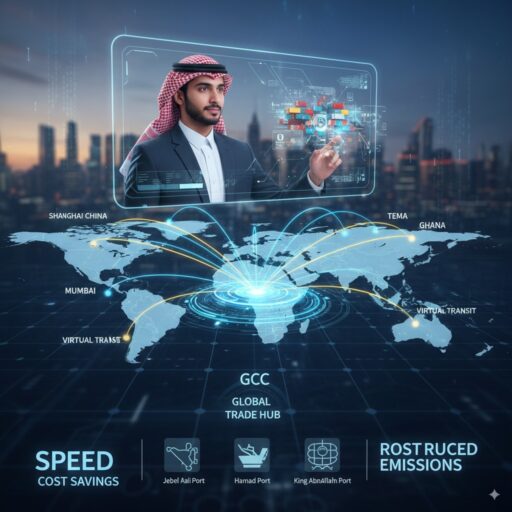The logistics landscape in the Gulf Cooperation Council (GCC) is changing fast. Gone are the days when procurement professionals could rely on the cheapest freight forwarder without considering what happens when things go wrong. I’ve watched companies scramble when their single-source suppliers faced disruptions, and it’s not pretty.
By 2025, GCC procurement teams are set to completely reshape how they choose logistics partners. They’re moving beyond cost considerations to focus on one critical factor: resilience. The question isn’t whether your freight forwarder can handle smooth operations – it’s whether they can keep your goods moving when everything else falls apart.

Agile Sourcing Strategies: Building Flexibility Into Your Supply Chain
### The End of the Single-Source Era
Traditional logistics relied heavily on single sourcing from distant suppliers, often concentrating operations in one geographic region. This approach worked fine until COVID-19 exposed its weaknesses. Companies that put all their eggs in one basket found themselves completely stuck when borders closed and factories shut down.
Smart procurement professionals in the GCC are now adopting three key strategies:
**Nearshoring** brings production closer to home. Instead of sourcing everything from Asia, companies are looking at suppliers in Eastern Europe, North Africa, and even within the GCC itself. A Dubai-based retailer I know recently shifted 40% of their textile sourcing from Bangladesh to Turkey – the shipping time dropped from 45 days to 12 days, and they can respond to market changes much faster.
**Reshoring** takes this concept further by bringing production back to the GCC or nearby regions. While labor costs might be higher, the total cost of ownership often works out better when you factor in reduced shipping costs, faster time-to-market, and lower risk exposure.
**Diversification** means spreading your risk across multiple suppliers and regions. The old “don’t put all your eggs in one basket” advice applies perfectly here. Companies are now maintaining supplier relationships across at least three different geographic regions.
Real-World Impact
I recently spoke with a procurement manager at a major UAE construction company who shared their experience. They used to source 80% of their materials from a single region in Asia. After experiencing delays that cost them millions in 2020, they diversified their supplier base across six different countries. Yes, managing multiple relationships requires more effort, but they’ve avoided three major disruptions since then that would have stopped their projects completely.
Robust Contingency Planning: Preparing for the Unexpected
Beyond Natural Disasters
Contingency planning used to focus mainly on natural disasters – hurricanes, earthquakes, floods. Today’s logistics professionals in the GCC face much more complex challenges. Geopolitical tensions can close shipping routes overnight. Cyber attacks can shut down port operations for days. Currency fluctuations can make established trade routes economically unviable.
The freight forwarders winning contracts in 2025 are those with detailed response plans for multiple scenarios:
* **Geopolitical risk management**: Alternative routing plans when traditional shipping lanes become problematic
* **Cyber security protocols**: Backup systems and manual processes when digital infrastructure fails
* **Financial hedging strategies**: Protection against currency fluctuations and sudden cost increases
* **Capacity management**: Reserved space with multiple carriers and alternative transportation modes
The Cyber Risk Reality
Cyber threats deserve special attention because they’re growing rapidly. The 2021 cyber attack on the Colonial Pipeline in the US showed how digital disruptions can create physical supply chain problems. In the GCC, where much of the logistics infrastructure is highly digitized, cyber resilience is becoming as important as physical infrastructure resilience.

Freight forwarders are investing heavily in cybersecurity, not just to protect their own operations but to ensure they can maintain service when other parts of the supply chain face digital disruptions. This includes backup communication systems, offline tracking capabilities, and alternative documentation processes.
Regional Consolidation: One GCC, One Logistics Corridor
Breaking Down Artificial Barriers
The GCC has six member countries, but smart logistics companies are treating it as one integrated market. This shift makes enormous sense – the total population is about 57 million people with significant purchasing power, and the geographic area is relatively compact.
Jebel Ali in Dubai has emerged as the clear regional hub, handling over 15 million containers annually. But instead of competing with other GCC ports, successful logistics strategies now use Jebel Ali as the primary entry point and distribute efficiently to secondary markets.
Hub-and-Spoke Advantages
This hub-and-spoke model offers several benefits:
* **Economies of scale**: Larger volumes through the primary hub reduce per-unit costs
* **Inventory optimization**: Regional distribution centers can serve multiple markets efficiently
* **Faster response times**: Pre-positioned inventory closer to end markets
* **Reduced complexity**: Dealing with one primary customs clearance point instead of six different procedures
I’ve seen companies reduce their regional logistics costs by 25-30% by consolidating their GCC operations through Dubai and using efficient distribution networks to reach other markets. A Saudi retailer recently told me they can now deliver products to Kuwait faster by routing through Dubai than by using direct shipping to Kuwait City.
The Network Effect
Regional consolidation creates a network effect where the whole becomes greater than the sum of its parts. When freight forwarders can offer seamless service across all GCC markets through integrated systems, they become much more valuable to their clients.
This trend is particularly important for e-commerce companies expanding across the region. Instead of setting up separate logistics operations in each country, they can establish one regional hub and distribute efficiently across all markets.
The New Reality: Risk Management as Core Requirement
Moving Beyond Cost Competition
The transformation happening in GCC logistics procurement represents a fundamental shift in priorities. Cost will always matter, but resilience has become the deciding factor between comparable options.
“We used to choose freight forwarders based on who could move our goods cheapest. Now we choose based on who can guarantee they’ll move our goods no matter what happens.” – Regional Procurement Director, Major GCC Retailer
This change reflects hard-learned lessons from recent disruptions. Companies that saved 10% on logistics costs but lost millions in revenue due to supply chain interruptions quickly realized the math doesn’t work.

What This Means for Procurement Teams
Procurement professionals are developing new evaluation criteria:
* **Scenario testing**: How does the freight forwarder perform under stress conditions?
* **Network redundancy**: How many alternative routes and methods can they offer?
* **Technology resilience**: What happens when their primary systems fail?
* **Financial stability**: Can they weather economic storms without service disruption?
* **Regional integration**: How well do they connect different GCC markets?
The Competitive Advantage
Companies that adapt to this new reality first will have significant competitive advantages. While their competitors struggle with disrupted supply chains, resilient companies will maintain customer service levels and potentially gain market share.
I believe we’re seeing the emergence of a two-tier logistics market: companies with resilient supply chains that can handle disruptions, and those that can’t. The gap between these two groups will only widen as global uncertainty continues.
The message from GCC procurement professionals is crystal clear: supply chain risk management isn’t an add-on service or nice-to-have feature. It’s become the foundation of modern logistics partnerships. Freight forwarders that understand this shift and build genuine resilience into their operations will thrive. Those that continue competing solely on cost will find themselves increasingly irrelevant in a world where keeping goods moving matters more than moving them cheaply.


